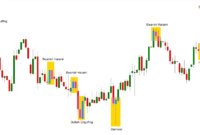When it comes to forex trading, choosing the right broker is crucial for your success. Among the various types of brokers, ECN (Electronic Communication Network) and STP (Straight Through Processing) brokers are two of the most popular options. This article will delve into the intricacies of ECN vs STP brokers, helping you make an informed decision based on your trading style and needs.
What Are ECN Brokers?
Definition and Functionality
ECN brokers connect traders directly to the interbank market, allowing them to trade with other participants, such as banks, financial institutions, and other traders. This structure facilitates transparency, providing traders with real-time pricing and a wide range of liquidity providers.
Key Features of ECN Brokers
- Direct Market Access: ECN brokers offer direct access to the market without dealing desk intervention. This means trades are executed at the best available prices.
- Tight Spreads: Due to competition among liquidity providers, ECN brokers often provide tighter spreads, which can be beneficial for day traders and scalpers.
- Variable Pricing: Prices can fluctuate rapidly, reflecting real-time market conditions. This can lead to better trading opportunities but also higher volatility.
- Transparency: With no conflict of interest, traders can see the actual market prices, enhancing trust and security.
Advantages of ECN Brokers
- Better Execution Speeds: ECN brokers usually offer faster execution times due to direct market access.
- No Requotes: As trades are executed in real-time, there are typically no requotes, which can be advantageous in fast-moving markets.
- Diverse Trading Options: Traders can access a variety of trading instruments, including forex, commodities, and indices.
Disadvantages of ECN Brokers
- Higher Commissions: ECN brokers often charge higher commissions than STP brokers to compensate for their services.
- Complexity: The ECN model may be more complex for beginner traders to navigate, requiring a better understanding of market dynamics.
What Are STP Brokers?
Definition and Functionality
STP brokers process client orders directly through their liquidity providers without any intervention. They act as intermediaries, executing trades on behalf of their clients. This model simplifies trading and provides several advantages.
Key Features of STP Brokers
- Order Execution: STP brokers execute orders automatically, ensuring that trades are carried out without delay.
- Fixed and Variable Spreads: Depending on market conditions, STP brokers can offer both fixed and variable spreads, providing flexibility for traders.
- Market Maker Relationships: Many STP brokers maintain relationships with liquidity providers, which can enhance trade execution quality.
Advantages of STP Brokers
- Lower Spreads: While they may not always offer the tightest spreads like ECN brokers, STP brokers generally provide competitive pricing.
- Ease of Use: STP brokers are often more user-friendly, making them suitable for beginners.
- Lower Commissions: Many STP brokers offer lower or no commissions on trades, which can save costs for frequent traders.
Disadvantages of STP Brokers
- Possible Conflict of Interest: Some STP brokers may have a conflict of interest as they can also act as market makers, potentially leading to less favorable pricing for traders.
- Slippage: Due to varying market conditions, slippage can occur during execution, affecting trade outcomes.
ECN vs STP Brokers: A Comparison
Execution Speed
Execution speed is crucial in forex trading. ECN brokers typically offer faster execution times due to their direct connection to the interbank market. In contrast, STP brokers may experience slight delays since they route orders through liquidity providers.
Spreads and Fees
- ECN Brokers: Generally, ECN brokers provide tighter spreads because of the competition among multiple liquidity providers. However, they charge higher commissions to maintain their services.
- STP Brokers: STP brokers can offer both fixed and variable spreads, but their spreads might be slightly wider than those offered by ECN brokers. They usually charge lower commissions or none at all.
Transparency and Trust
Transparency is a significant factor in choosing a broker. ECN brokers are known for their high level of transparency, as traders can see real-time market prices. STP brokers also provide transparency but may not be as open about the liquidity providers they use, leading to potential conflicts of interest.
Trading Conditions
The trading conditions can vary widely between the two types of brokers:
- ECN Brokers: Best suited for high-frequency traders and those who require direct market access. They thrive in volatile conditions where quick execution is necessary.
- STP Brokers: Ideal for novice traders and those looking for a straightforward trading experience with lower costs. They cater well to traders who prefer longer-term strategies.
Choosing the Right Broker for You
Assess Your Trading Style
Your trading style plays a vital role in determining whether an ECN or STP broker is the right choice. Consider factors such as:
- Frequency of Trading: If you plan to execute numerous trades daily, an ECN broker may offer the best conditions.
- Experience Level: Beginners may find STP brokers more user-friendly and less intimidating.
- Market Conditions: If you often trade during high volatility, ECN brokers may provide better execution speeds.
Evaluate Costs
When choosing between ECN and STP brokers, it’s essential to evaluate the total costs involved, including spreads, commissions, and any potential fees. Calculate your average trading volume to determine which broker would be more cost-effective for you.
Check for Regulation
Ensure that your chosen broker is regulated by a reputable authority. This adds an extra layer of protection for your funds and ensures that the broker adheres to industry standards.
Conclusion
In the debate of ECN vs STP brokers, both options have their strengths and weaknesses. The choice ultimately depends on your trading style, experience, and specific needs. ECN brokers offer faster execution and greater transparency, making them ideal for experienced traders. On the other hand, STP brokers provide a more straightforward approach with lower costs, appealing to novice traders.




